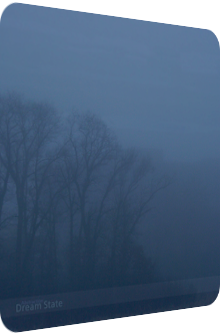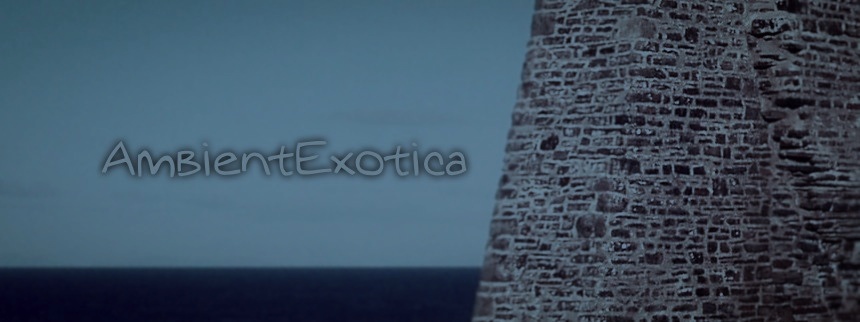
Abstraction
Dream State
2012
Dream State is the third release of Abstraction aka Minneapolis-based multi-instrumentalist Ben Burnes, self-released in March 2012 and available to purchase and listen to in full at Bandcamp. Its four tracks showcase Burnes’ love for omnifarious genre standards, even if they just appear in the form of particles. The tonality and scope of video game soundtracks is baked into the sceneries as well, which is no coincidence, as these bits match the producer’s field of knowledge (he also writes the music for games). Created and recorded in 25 days during February 2012, Dream State may sport a formulaic title that is unfortunately all too inexpressive in today’s competitive landscape, but as the connoisseur knows, it is all about the music, and in this regard, Abstraction’s work is neither vapid nor trivial, but functions as an unexpected vestibule to the early 90’s where electronic music was free of genre conventions, watchful eyes and the many do’s and don’ts that were rapidly imposed only a few years later. The blueprint of all compositions is based on the always welcome Drone genre, that much is clear. In addition, though, Dream State features crafty rhythms, breakbeat appendixes, nostalgic field recordings, yearning pianos, gorgeous steppe-like dioramas and, last but not least, shows Ben Burnes’ great ear for melodies. There is always a playful undercurrent floating through the arrangements, the artist never succumbs to a forcefully constructed cinematography. Alas, there is another tiny letdown, but you won’t notice it at all in the music itself. I am talking about the concept itself which, in tandem with the album title, might fuel withdrawal: Dream State is about the depiction of a journey through sleep. Been there, done that. As you read these lines, 167 bedroom musicians – and counting… – all around the globe focus on the same concept, but again, I am not being sarcastic or mean-spirited at all. I just want to stress how important a distinct concept is, regardless of the fact that we are all standing on the shoulders of giants. Luckily, the four tracks outshine the moss-covered outer-musical surroundings, and glaringly so.
Almost starting in medias res, the opener of over ten minutes Drifting To Uncharted Waters already showcases its music box melody which hails from a backdrop soaked in raindrops and moisture. Gentleness reigns over these uncharted waters, but despite the cozy shelter-spending encapsulation, there is also a certain hollowness evoked. The missing link is brought in by Benjamin Burnes via heterodyned synths and celestial harmonies. Willfully degraded by means of a frequency-silkening transistor radio-like nostalgia layering technique, but still emanating a rose-tinted lachrymosity, these blurred and fragile washes float through the – now misty and rainless – atmosphere, constantly emitting diffuse haze and melancholic cloudlets. Beguiling and erbaceous, the aura is further ameliorated with ligneous tonewoods, echoey afterglows thereof, glistening wind chimes and downwards spiraling vortexes of liquid tendrils. Only a moment later, the most surprising inclusion of the album comes in the shape of Unlikely Landscape, a most fitting title for such a track. A breakbeat of soft kick drums and retro handclaps is added to a strikingly Mediterranean guitar melody which seems to have absorbed the warmth of desert-like countries in order to augment it even further with shady-crepuscular Oriental ornaments. Geiger counter-like crackles remind of the millennial Clicks & Cuts genre, the mercilessly blurred unfolding of the synths in the distance meanwhile resembles the simmering heat of empty lands. As if these wonderfully and embraceable clichés were not enough, a Portuguese accordion rounds off the proto-Balearic scenery. This is nonetheless a proper Ambient track, and once the melancholic piano chords hit in the final minute or two, said Unlikely Landscape has truly lived up to the title thanks to its shapeshifting gestalt. Despite the journey-like aspect and the sense of movement during a period of great heat, the elements and surfaces Abstraction adds are never alatoric.
A particularly eclectic yet accessible composition follows: Theta Rhythm cross-fades into the piano serenade of Unlikely Landscape and makes it its essence. The reverberated two-tone keys become entangled with a simultaneously bustling and laid-back rhythm structure supercharged with hi-hats, snares and percussion-like splinters. A staggering kick drum adds oomph and gravitas to the scenery, and once the impetus of the piano wanes, Abstraction succumbs to an acidic way of life and adds the well-known post-Rave wonkiness to the incrasingly emaciated and jejune ambiance. That Theta Rhythm still feels like an Ambient track and remains very close to the genre is thankfully realized through a carefully balanced maintenance of the layers. Pitch-black silence, arpeggiated rotatory movements, plinking prongs, bucolic blebs and the long-winded beatless passages make the titular rhythm feel eminently progressive and forward-moving. Whereas Unlikely Landscape hinted at floatation as a movement, Theta Rhythm turns this impression around and wants the listener to literally move. The 4/4 beat in its second half makes it possible. Needless to say that this is not how the tune actually ends. In lieu of a club-friendly culmination point, Benjamin Burnes lets it fade into the finale Recovery From Fugue, and the word fugue is indeed a formidable trigger, as it both points at a music-related contrapuntal melody which is then realized via different instruments or synths on the one hand, and a – hopefully momentarily – missing state of awareness in one’s identity. Whatever interpretation Abstraction prefers, the arrangement undoubtedly allows both of them. Dun-colored and hued in a deep-blue mood, the composition is supercharged with sadness and isolation. A five-note piano theme is accompanied by droning specters, occasionally towering above them, only to be then deeply encapsulated within their reach. Static noise, jitters and other protuberances disturb the melody from time to time, but the piano manages to throne above the scenery like a lighthouse. The album ends the way it began: with an admixed field recording of pouring rain and chirping birds, but sans the music box.
Abstraction’s third album Dream State showcases the will to intermingle multitudinous different styles into an album, an always dangerous affair and risky endeavor, but skillfully resolved here. As I find myself – probably one too many times – washed away in Drone music, it is a relief to also find synthetic drone helixes in Burnes’ album, but downright refreshing to spot them as the base frame for distinct ameliorations, with the prominent beat structures in Unlikely Landscape and Theta Rhythm being the showstoppers in this regard. And yet Abstraction is no sole subject to either side of the pendulum. Neither are his tracks histrionic and mercilessly club-oriented, nor do they emit formulaic and thus soulless strata or sinews. I spot three very important ingredients that make up the album’s atmosphere: firstly the aforementioned rhythmic riverbeds which spice up the aquatic or glowing sceneries, secondly the appearance of many a real-world instrument such as accordions and piano chords, and thirdly the strong focus on the melodious side. All these elements combined let Dream State fall out of its time. Sure, thanks to the liberation of the internet, all styles happen simultaneously, and the death of a genre will never occur again, no matter how niche or picayune it may seem to the erudite listener. But Dream State twirls to the 90’s where hymnic classics such as Leftfield’s Leftism (1995) or Gas’ beat-driven eponymous album (1996) materialized, absorbing the post-Rave nature and moulding it into cosmic anthems. Dream State comes decades too late if one views it through a musicologist’s glasses, but no worries, for Abstraction balances and positively streamlines every molecule, be it ever so incompatible or de trop. From the purified music box-accentuated AM frequency haze called Drifting To Uncharted Waters and the desert-like midsummer night’s postlude Unlikely Landscape, over the emaciated Miami arpeggio in Theta Rhythm to the ambivalent state of tranquility in Recovery From Fugue, Benjamin Burnes’ album fathoms out the melting pot of the Rave/Grunge decade when their sets of rules had yet to be formed… and sticked to. Retrogression is the future. Dream State may be pulled along in the slipstream of other works, but it is a versatile, polyhedric precious stone.
Further listening and reading:
- You can purchase and fully stream Dream State at Bandcamp.
- Abstraction/Benjamin Burnes is on Twitter: @bFusion.
Ambient Review 282: Abstraction – Dream State (2012). Originally published on Nov. 13, 2013 at AmbientExotica.com.
